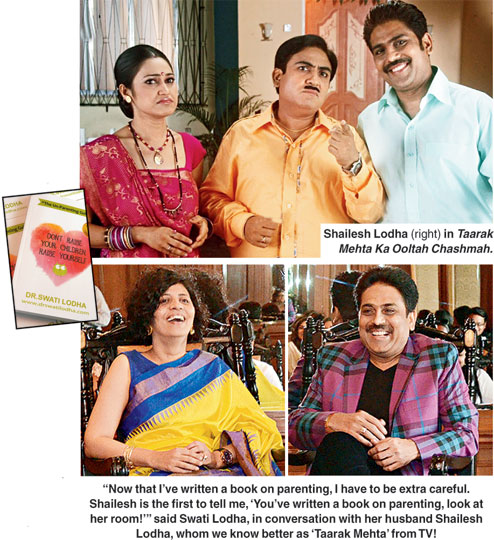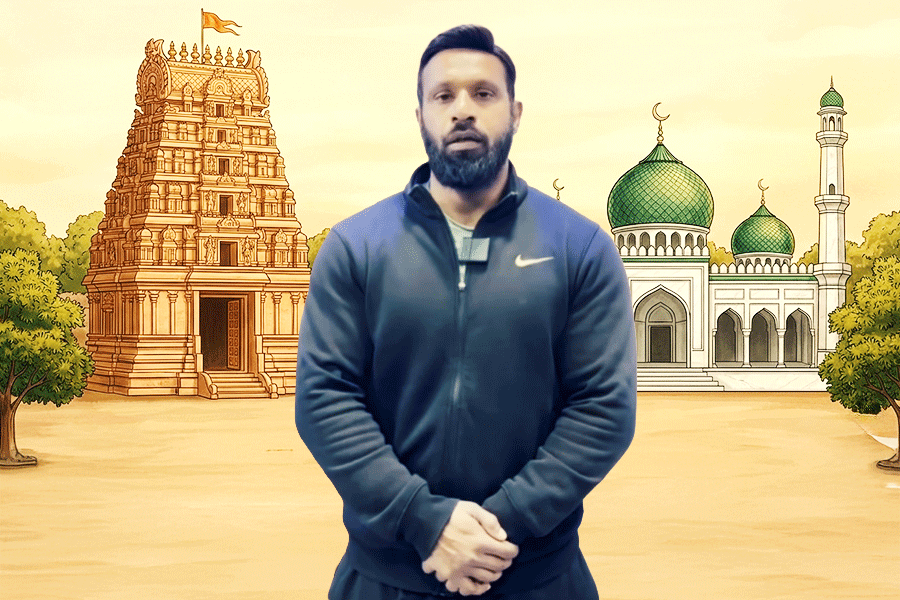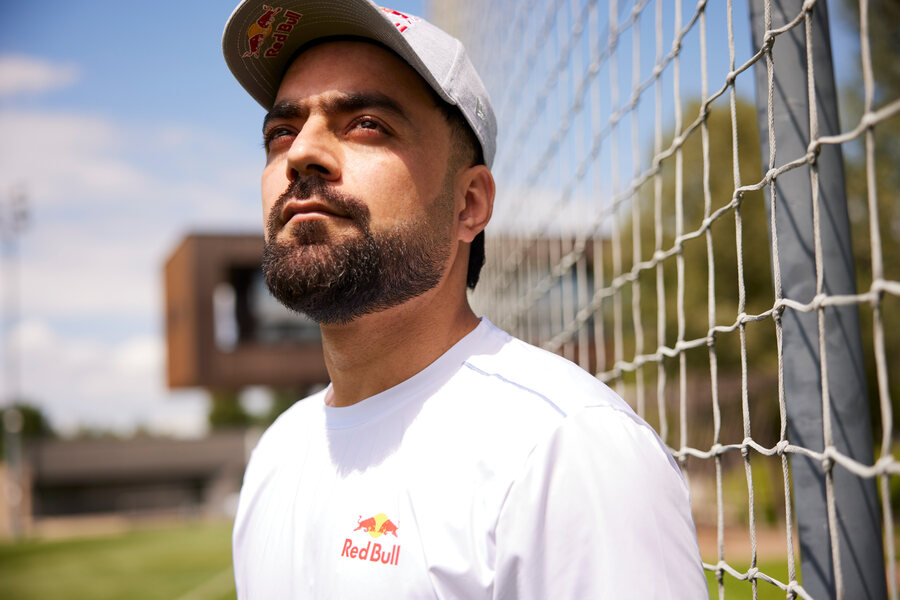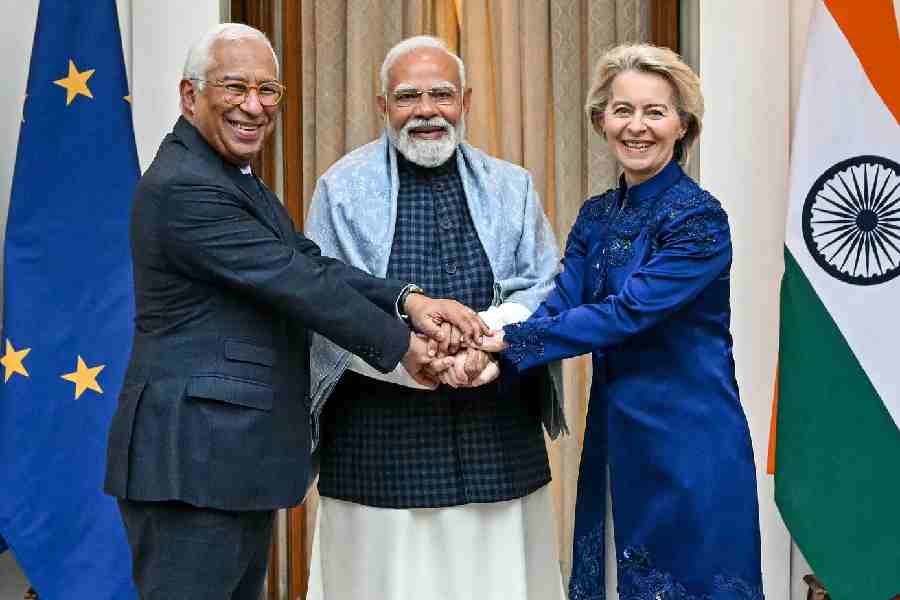
It’s not often that a husband and wife get to spar on the dais at An Author’s Afternoon. On April 29, Shailesh Lodha, noted for his role as Taarak Mehta in the hugely popular Hindi sitcom Taarak Mehta Ka Ooltah Chashmah quizzed his wife Swati Lodha on her latest book, Don’t Raise Your Children, Raise Yourself (StoryMirror Infotech, Rs 300).
Shailesh began by admitting that English was not his first language. “He always says my English is like my wife; I love her but I have no control over her,” quipped Swati. “Yes... and my English is also bad...” he returned the volley, amid peals of laughter.

And so began this rib-tickling session of An Author’s Afternoon, presented by Shree Cement and Taj Bengal and held in association with t2, Prabha Khaitan Foundation and literary agency Siyahi. Excerpts from the chat...
Shailesh: Swati’s first book, a collection of Hindi poetry, was published in 1992 when she was in Class XII. Her next book of poetry was co-authored with her husband [meaning himself], called Ek Baat Teri Ek Baat Meri, which explored two different aspects of the same theme, one emotional, one philosophical. Then came Come On! Get Set Go, a self-help book that was translated in many languages. After that it was Why Women Are What They Are, which is a difficult topic to write on...
Swati: Did you read that?
Shailesh: No, I did not. I knew I wouldn’t be able to understand it. Anyway, look at the variety in your work. Why don’t you make up your mind?
Swati: Do you want me to be like you?! There’s a lot of fluidity in the way I think. I never thought I’d stop writing Hindi poetry but soon after I met Shailesh, I realised he writes much better poetry and when we got married, I thought there would be a constant comparison. I knew he would not change, so I diverted to prose. We did experiment with Ek Baat Teri Ek Baat Meri, which was well-received, but you can imagine how difficult it is to write together, on the same topic with your husband!
Shailesh: But let me accept that I did not write a single word of Come On! Get Set Go. My only contribution to that book was the title. But she gave me the credit anyway. But it sold like hot cakes, so why didn’t you continue with self-help?
Swati: I have a Phd in women’s entrepreneurship. I feel very strongly about women and the challenges we face. Why Women Are What They Are was translated into more then 10 languages and is also used as research material on Indian women. As for parenting, it is something we feel we can learn, hands on. We’ve seen our parents do it, so we think we can too. I don’t think it’s that easy. In this age of acceleration when everything is changing so fast, I think we need to sharpen our skills every few years to raise the next generation.
THE PARENT TRAP
Shailesh: So you think parenting can be taught?
Swati: Why not? If you can learn to be confident or effective speakers, why can’t we learn how to update ourselves as parents? I feel parenting is an emotion. Some people have it and some people don’t. A lot of young people at my workshops have told me they don’t want to be parents. So be it. Don’t get into it just because everyone else is doing it. Parenting is all about observing, encouraging, guiding, nurturing and you can do that with an infant, a child or even an idea and a cause or an organisation....
I’m working on a trilogy on this topic and Don’t Raise Your Children, Raise Yourself is the first. I have a co-author for the second — Why Parents Suck — and this time it’s my daughter, Swaraa, who’s in Class XI. Her opening line is — ‘Parents are like ovens; they’re always on preheat.’ The third book will connect parenting and leadership, exploring how we can take the best of parenting skills to the workplace and the best of leadership skills home.
Shailesh: So two members out of three in the family are writing a book on why parents suck… I hope it’s not about the third member! Don’t Raise Your Children, Raise Yourself — can you elaborate on the title?
Swati: Well, we like to blame others for things that go wrong, at home or outside. Even as parents, we like to take credit for things that go well but when things go wrong we say, ‘Oh I tried but the kids didn’t listen’ or ‘this was the best we could do then’. But the universal law of change suggests that there is only one person we can change and that is ourselves. So why are we trying to mould the kids all the time?
THE MOON THEORY
Shailesh: What is the concept of Moon Parenting that you have described in the book?
Swati: It’s a simple concept. The way the moon moves from full moon to new moon and back to full moon in 28 days is very similar to our journey as parents. In the beginning, we are the full moon, always present for our children.
Slowly we become the new moon, where we’re there but not always making our presence felt, giving our kids some freedom. By the time the kids grow up, our presence wanes further. The second part of the parenting journey is about being grandparents and how grandparents can help bring up grandchildren. There is role reversal in the full moon period this time, because now the children take care of the parents. This is the Indian way of parenting.
Shailesh: Yes, Indian parents pretend we’re not there but we’re always here. But a lot of bahus blame the grandparents for spoiling their children and don’t like interference.
Swati: Sure, maybe their thoughts don’t match but working parents agree that it’s better to leave the kids at home with grandparents. And sometimes children will listen more to grandparents than anyone else.
Shailesh: Do you think there is a lack of respect (among children) these days?
Swati: The way respect is given is changing. Parents used to think obedience is the king and disagreement was considered disrespectful. But that doesn’t hold true anymore. These days children want to be heard.
THE FRIEND ZONE
Shailesh: Should parents and children be friends?
Swati: I am not a fan of this particular thought. I think our children already have many friends but they have only one set of parents. Lots of friends means lots of peer pressure and these WhatsApp groups are making things worse.
Shailesh: Tell me how do we get rid of these mobile phones!
Swati: We can tell our kids not to use the phones when we ourselves use it less. Even at night if there is a ping, we jump at the phone... so how do we expect our kids not to do that? If we can make rules for ourselves to not look at our phones all the time, not browse through Facebook first thing in the morning, then they can follow our example. If you want your kids to read, you have to read as well. I can’t imagine that your kids won’t inculcate the habit of reading if you read every day. Kids will never do what we say, they will do what we do.
END NOTES
Shailesh: What are modern parents doing wrong?
Swati: Patience is something that is not there at all. We are not as patient as we used to be and the kids are even less patient. The average attention span for adults is 7 seconds these days, which is less than the attention span of a goldfish! I also think, admit your mistakes to the kid so the kids learn how to apologise.
Shailesh: Really? In front of the children?
Swati: Of course!
Shailesh: I have never even hugged my parents. I can’t wish them on their birthdays also!
Swati: You come from a different planet. I’ve called your father on his birthday!
Shailesh: Yes, you want his property…. (Ends amid much laughter)
Text: Ramona Sen
Pictures: Arnab Mondal











